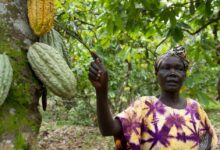Deforestation Surges In 2022 Despite Pledge

An area of tropical forest the size of Switzerland was lost last year as tree losses surged, according to new research.
It means that a political pledge to end deforestation made at COP26 by world leaders is well off track.
Some 11 football pitches of forest were lost every minute in 2022, with Brazil dominating the destruction.
But a sharp reduction in forest loss in Indonesia shows that reversing this trend is achievable.
One of the key moments at the COP26 climate meeting in 2021 saw over 100 world leaders sign the Glasgow Declaration on forests, where they committed to work collectively to “halt and reverse forest loss and land degradation by 2030”.
In total, leaders from countries covering around 85% of global forests signed up. This included former Brazilian president Jair Bolsonaro, who had relaxed the enforcement of environmental laws to allow development in the Amazon rainforest.
The Glasgow pact was agreed after a previous agreement signed in 2014 failed to stem the relentless loss of trees.
Now a new analysis carried out by Global Forest Watch shows that the new promise made in Glasgow is not being kept.
Losses of tropical primary (old-growth) forest are seen as particularly critical for global warming and biodiversity.
Rainforests in Brazil, Democratic Republic of Congo and Indonesia absorb huge amounts of greenhouse gases.
Clearing or burning these older forests sees that stored carbon released to the atmosphere, driving up temperatures around the world.
These forests are also critical for maintaining biodiversity and the livelihoods of millions of people.
Scientists warn that these functions – or “ecosystem services” – can’t easily be replaced by planting trees elsewhere, because these forests have developed over such a long period of time.
According to the new data, gathered by the University of Maryland, the tropics lost 10% more primary rainforest in 2022 than in 2021, with just over 4m hectares (nearly 16,000 sq miles) felled or burned in total.
This released an amount of carbon dioxide equivalent to the annual fossil fuel emissions of India.
“The question is, are we on track to halt deforestation by 2030? And the short answer is a simple no,” said Rod Taylor from the World Resources Institute (WRI) which runs the Global Forest Watch.
“Globally, we are far off track and trending in the wrong direction. Our analysis shows that global deforestation in 2022 was over 1 million hectares above the level needed to be on track to zero deforestation by 2030.”
Brazil dominates the losses of primary tropical forest and in 2022 this increased by over 14%.
In Amazonas state, which is home to over half of Brazil’s intact forests, the rate of deforestation has almost doubled over the past three years.
Source: BBC








